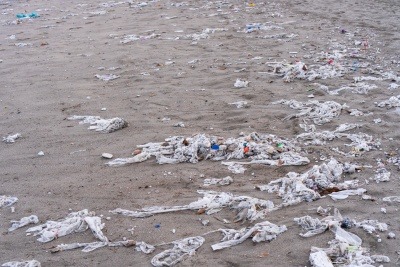UK sales of plastic wet wipes look set to be banned
Defra and the Scottish Government are planning legislation that will ban the supply and sale of wet wipes that incorporate plastic, in a bid to tackle the environmental, economic and health-related impacts of plastic pollution.
 Environment Secretary Steve Barclay announced the move yesterday, following a consultation conducted at the end of last year which investigated public attitudes to a plastic wet wipes ban.
Environment Secretary Steve Barclay announced the move yesterday, following a consultation conducted at the end of last year which investigated public attitudes to a plastic wet wipes ban.
Highlighting the environmental significance of the ban, Barclay commented: “Wet wipes containing plastic are polluting our waterways and causing microplastics to enter the environment.”
“I have been clear that a step change is needed to protect our waterways from pollution. The ban builds on a raft of actions already taken to protect our waterways and hold water companies accountable - including accelerating investment, putting water company fines back into the environment and quadrupling the number of inspections of water company sites.”
The ban will apply across the UK, but will be enforced by separate regulations under each devolved government.
The legislation is expected to come into effect in England ahead of summer recess and by autumn in Wales, Scotland and Northern Ireland. Once the legislation has been introduced, there will be an 18-month transition period to allow businesses time to prepare and enable stock of plastic-containing wet wipes to be sold.
Details of the plastic wet wipes ban
Consumers will no longer be able to purchase plastic-containing wet wipes, but plastic-free wet wipes will remain on the market. In fact, some major retailers - including Boots, Aldi, Tesco - have already removed plastic wet wipes from their shelves.
Commenting on the change, Luke Emery, Plastics and Packaging Director at Aldi, said: “The removal of plastic from Aldi wet wipes two years ago has been positive for our customers and the environment. It has removed an estimated 7,000 tonnes of unnecessary plastic from the system and has been welcomed by Aldi shoppers.”
Plastics no longer permitted for use in wet wipes under the new regulations include bio-based, biodegradable and compostable plastics. However, viscose, lyocell and cotton are allowed.
Due to the significant size of the wet wipe manufacturing industry in the UK, the ban applies to sale and supply only, not to manufacture. In other words, in line with other single-use plastic bans, companies can still manufacture plastic-containing wet wipes in the UK, as long as they sell them overseas.
The ban does not apply to medical and industrial settings where plastic-free wet wipes are not viable due to, for example, their tensile strength or ability to hold certain disinfectants.
Businesses such as hospitals and food production sites will continue to be able to buy plastic wet wipes from wholesalers or manufacturers, but must not sell them on to customers.
Individuals who require medical care in their own home (e.g. stoma care) will be able to request plastic wet wipes from registered pharmacies.
Findings of the public consultation
In a consultation which ran from October to November 2023, the Government received 1,561 responses from the general public, NGOs and businesses expressing their opinions on a proposed plastic wet wipes ban.
A large majority - 95 per cent - of respondents were in favour of the ban, with the public and NGOs being particularly supportive.
60 per cent of businesses and 70 per cent of wet wipe manufacturers disagreed or strongly disagreed with the proposal to ban the manufacture of plastic-containing wet wipes in the UK. Manufacturers raised concerns about unnecessary loss in revenue and jobs, highlighting the cost of transitioning to plastic-free alternatives.
Though 15 per cent of manufacturers strongly supported a ban due to its potential to reduce the negative impacts of plastic pollution on ecosystems and human health, over half of manufacturers said they would not seek to transition to plastic-free products if a ban was not introduced.
Regarding banning the sale and supply of plastic wet wipes, around two thirds of respondents felt a ban would not impact consumers, while 13 per cent expressed concern regarding the impact on certain groups (e.g. young children and medical patients).
The Government’s response to the consultation was published yesterday.
A blight on the environment
Wet wipes are a major source of plastic pollution. They clog waterways, wash up on beaches and riverbanks, leach microplastics into water, and cause the accumulation of damaging chemical and biological pollutants.
According to Defra Beach Litter Monitoring Data, from 2015-2020 an average of 20 wet wipes were found per 100m of beach surveyed across the UK.
The Government hopes that banning their sale and supply will help to clean up the UK’s land and oceans.
Other single-use plastic items which have been banned in the UK include cutlery, straws, drinks stirrers, cups, plates and food containers; microbeads in rinse-off personal care products; and, earlier this year, disposable vapes.
More to be done
Environmental groups have welcomed the new legislation, while underscoring that further action must be taken.
Jane Martin, CEO of City to Sea, said: “It’s a positive step forward to see the government take definitive action on banning this pollutant, but action must not end there. The government should now look to tackle all single-use plastic products through further bans and mandated reuse and refill targets.”
“Now it’s wet wipes. Next, we’d like to see a cap on - and reduction in - UK plastic production. With an election looming, eyes are on the government to step up the fight on plastics and protect the environment and human health.”
Charlotte Davies, Managing Director of Common Seas, added: “Bans are strong policy measures to tackle items that are avoidable or for which alternatives are readily available. However, addressing the UK’s plastics problem requires more than sporadic bans on individual items.”
“To make a significant impact, we need comprehensive policies that can address a wide range of items and influence product design, consumption, and disposal habits. Policies like Extended Producer Responsibility, promised in the 2019 Conservative manifesto (and recently postponed for the fourth time) hold significant potential for meaningful change.”
In a similar vein, Co-Founder of A Plastic Planet & Plastic Health Council, Sian Sutherland, commented: “This piecemeal approach, banning single use items one at a time, does not show the leadership we need in the plastic crisis. It does not give industry clear indication on future policy and business cannot commit to change without certainty on what will no longer be legal.”







